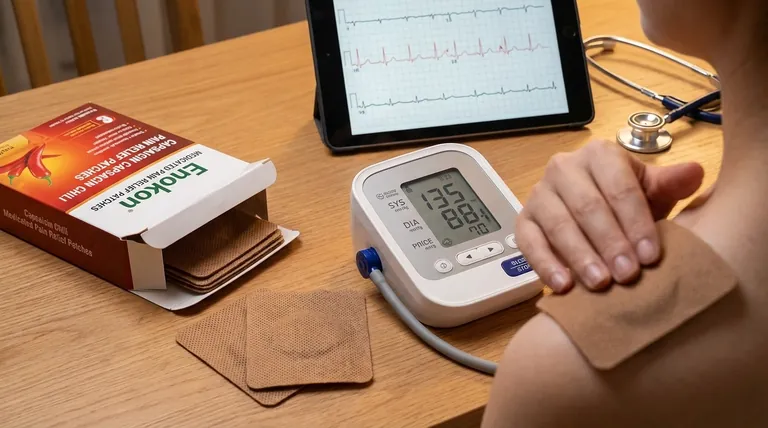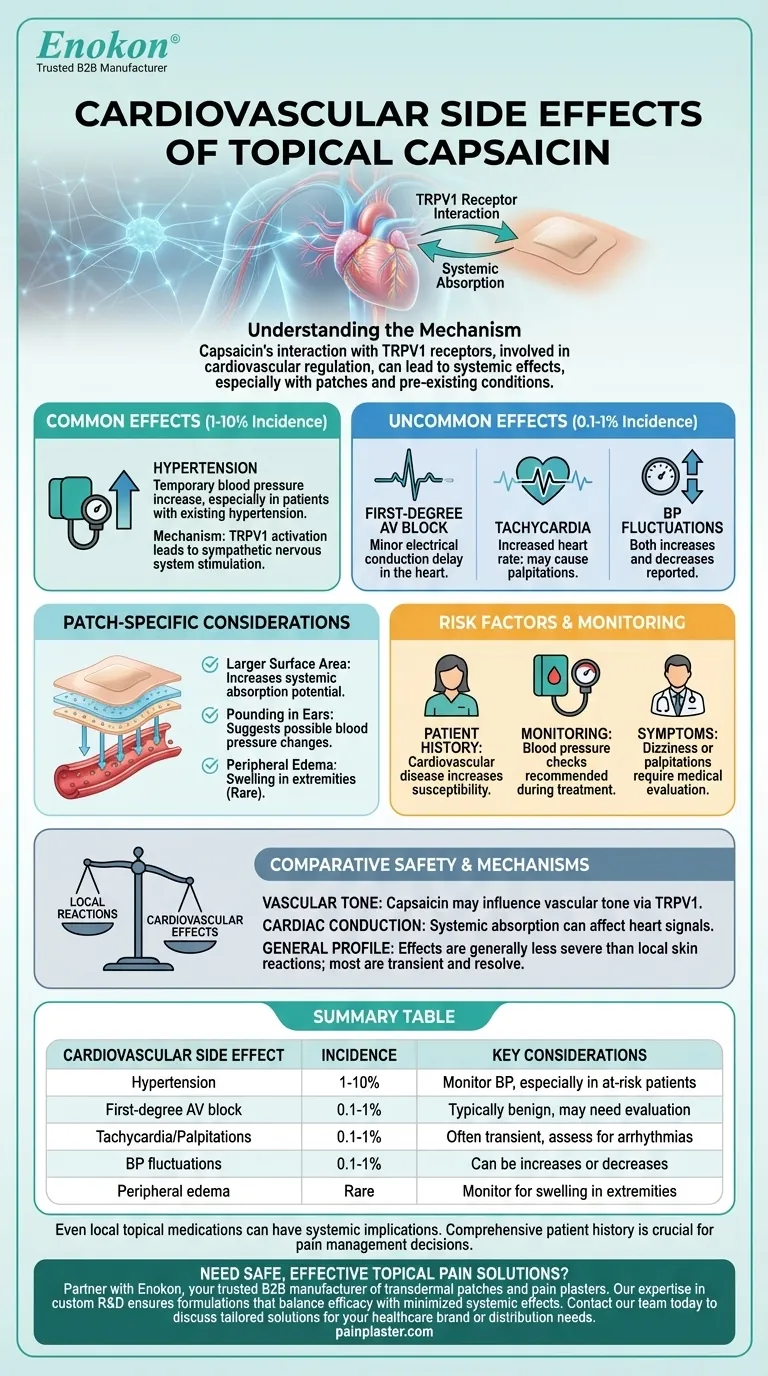Topical capsaicin, particularly in patch form, can cause several cardiovascular side effects ranging from common to rare occurrences. The most frequently reported cardiovascular effects include hypertension (1-10% incidence) and less commonly first-degree AV block, tachycardia, palpitations, and blood pressure increases (0.1-1% incidence). These effects likely occur due to capsaicin's interaction with TRPV1 receptors, which play a role in cardiovascular regulation. While most side effects are mild, patients with pre-existing heart conditions should be monitored closely when using capsaicin products.

Key Points Explained:
-
Common Cardiovascular Effects (1-10% incidence)
- Hypertension: The Capsaicin Patch may cause temporary increases in blood pressure, which is particularly relevant for patients with existing hypertension
- Mechanism likely involves TRPV1 receptor activation leading to sympathetic nervous system stimulation
-
Uncommon Cardiovascular Effects (0.1-1% incidence)
- First-degree AV block: A minor conduction delay in the heart's electrical system
- Tachycardia: Increased heart rate that may cause palpitations
- Blood pressure fluctuations: Both increases and decreases have been reported
-
Patch-Specific Cardiovascular Considerations
- The larger surface area of patches may increase systemic absorption
- Reports of "pounding in the ears" suggest possible blood pressure changes
- Peripheral edema (swelling in extremities) has been noted in some cases
-
Risk Factors and Monitoring
- Patients with cardiovascular disease may be more susceptible
- Blood pressure monitoring is recommended during treatment
- Symptoms like dizziness or palpitations should prompt medical evaluation
-
Mechanistic Considerations
- Capsaicin's effects on TRPV1 receptors may influence vascular tone
- Systemic absorption can potentially affect cardiac conduction
- Individual sensitivity varies based on application site and dosage
-
Comparative Safety Profile
- Cardiovascular effects are generally less severe than local skin reactions
- Most cardiovascular symptoms are transient and resolve with discontinuation
- Serious cardiac events are extremely rare with proper use
The cardiovascular effects of topical capsaicin, while usually mild, demonstrate how even locally applied medications can have systemic implications. This underscores the importance of considering a patient's complete medical history when recommending topical therapies for pain management.
Summary Table:
| Cardiovascular Side Effect | Incidence | Key Considerations |
|---|---|---|
| Hypertension | 1-10% | Monitor BP, especially in patients with pre-existing conditions |
| First-degree AV block | 0.1-1% | Typically benign but may require evaluation in cardiac patients |
| Tachycardia/Palpitations | 0.1-1% | Often transient; assess for underlying arrhythmias |
| Blood pressure fluctuations | 0.1-1% | Can include both increases and decreases |
| Peripheral edema | Rare | Monitor for swelling in extremities |
Need safe, effective topical pain solutions? Partner with Enokon—your trusted bulk manufacturer of transdermal patches and pain plasters. Our expertise in custom R&D ensures formulations that balance efficacy with minimized systemic effects.
Contact our team today to discuss tailored solutions for your healthcare brand or distribution needs.
Visual Guide

Related Products
- Capsaicin Chili Medicated Pain Relief Patches
- Heat Relief Capsicum Patch for Lower Back Pain Relief
- Far Infrared Deep Heat Relief Patches Medicated Pain Relief Patches
- Asthma Cough and Pain Relief Patch for Adults and Kids
- Menthol Gel Pain Relief Patch
People Also Ask
- Are natural and herbal pain relief patches effective and safe? Discover the Benefits of Targeted Relief
- What precautions should be taken with buprenorphine patches? Ensure Safe Use and Avoid Overdose Risks
- What is the purpose of capsaicin patches? A Guide to Temporary Pain Relief
- How do pain relief patches work? A Guide to Targeted, Long-Lasting Pain Relief
- How do you apply the Signal Relief patch to find the proper placement? A Step-by-Step Guide to Maximum Relief














